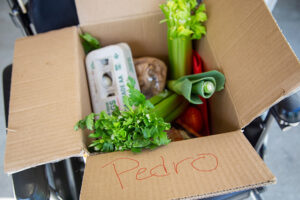How you’re helping neighbors like Pedro

Pedro, left, speaks with Diabetes Support Services volunteer driver Jan while receiving a food box delivery.
For people living on a limited income, receiving food assistance at a pantry is a vital way to lower grocery bills and make ends meet every month.
For Pedro, a 73-year-old widower who is living with a limited income and has diabetes and mobility issues, accessing a pantry and finding food that fits his strict diet present another set of challenges. He’s no longer comfortable driving and is unable to walk to the local food pantry, making it difficult to keep his cupboards stocked.
Fortunately, a Salem nonprofit has expanded its services to meet the nutritional needs of Pedro and thousands of other people living with diabetes.
Every week, volunteers with Diabetes Support Services deliver a box of hand-picked food items to Pedro’s home.
Food boxes he’d received from other pantries in the past had items he couldn’t eat due to allergies and dietary restrictions. Now, he’s receiving foods tailored to his diet and is saving money on grocery bills.

A food box contains items that are healthy for Pedro, who has diabetes and extensive food allergies.
“Without the diabetic food box, I have to spend more money,” he says. “Being a diabetic is very expensive.”
Diabetes Support Services offers education, supplies, and other support for people with diabetes and their families. It was founded in 2007 by Sandy, whose husband has been diabetic for nearly 60 years and who recognized a lack of education and resources for diabetes patients in the Willamette Valley.
Diabetes Support Services has had a relationship with Marion Polk Food Share since its early days, Sandy says, when the Food Share would provide produce for monthly meetings. When the pandemic arrived in March 2020, in-person support meetings came to an end and the organization decided to branch out into a new way to serve clients.
“We thought, ‘We have all this space here and we have a relationship with the Food Share. Let’s start a food pantry,’” Sandy recalls. “When we could no longer do diabetes education it gave us another calling.”
With help from a team of dedicated volunteers and food supplied in part by the Food Share, the pantry was up and running within weeks of the shutdown. Over one year later, the pantry has served more than 3,200 households and 10,000 individuals. Though in-person meetings have resumed, Sandy says her organization plans to keep the pantry running for the foreseeable future.
Clients who can are encouraged to visit the pantry to pick up food boxes, but delivery is available for people like Pedro who don’t have easy access to transportation. The food makes a big difference on his budget, his health and is key to helping him manage his diabetes.
“I wouldn’t know what to do if I didn’t have this food. It’s been so great, this program,” Pedro says. “I’ve been sleeping better knowing that there’s somebody that cares and will bring me a food box.”

